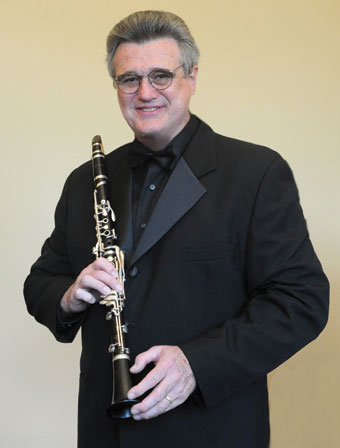Clarinet Rarities
by Jan Jezioro

BPO principal clarinetist John Fullam thinks the time is ripe for Reger
The Friends of Vienna launch their 37th season of Sunday afternoon concerts this Sunday, September 16 at 3:30pm, at their home in the Unity Church (1243 Delaware Avenue in Buffalo) with a recital featuring BPO principal clarinetist John Fullam, along with UB-based pianist Nancy Townsend and the rising young soprano Emily Helenbrook, now studying at the Eastman School and the University of Rochester.
Fullam enjoys exploring the wide range of both orchestral music and chamber music composed for his instrument, whether with the BPO, the Amberg Quartet, or, as in the case of his upcoming concert on the Friends of Vienna series, with freelance artists like Townsend and Helenbrook. One thing that Fullam is certain of is that the time has come for a reassessment of the music of the German composer Max Reger (1878-1916). This past June, after performing the Clarinet Quintet in A major, Op. 146, the last work that Reger composed before his death by heart attack at the age of 43, for the first time ever at the Roycroft Chamber Music Festival, Fullam decided that he would like to perform all seven of the chamber music pieces that Reger composed for clarinet.
Reger had a reputation both as an excellent pianist and especially as an organist, and his huge output of chamber music compositions combine both baroque structural elements, derived from his close study of the works of Bach, and other elements reflecting the opulent harmonies of late Romantic chromaticism. “Reger had a gift for melody on the level of Hugo Wolf or Richard Strauss,” says Fullam. “He had a gift for expanding harmonic voicing that might be compared to that of the Danish composer Carl Nielsen, and when his poignant dissonances are combined with a concise classicism, as is the case in much of his chamber music, the result are works, that if not masterpieces, are absolutely charming. When Reger tried to write for larger combinations of instruments, such as symphonic orchestras, his works became more problematical, and he was sometimes savaged by the critics, though no less a figure than Arnold Schoenberg declared Reger to be the greatest composer since Brahms.”
Fullam and pianist Townsend will open the program with two of the three miniature pieces for clarinet by Reger, the wistfully lyrical Albumblatt, a work of simple beauty, and the lively Tarantella, before performing the composer’s Sonata No. 1 in Ab, op. 49. “Reger was inspired to write his sonatas for clarinet and piano by the Brahms’ two Op. 120 clarinet sonatas”, says Fullam. “This will be the first time that I am performing Reger’s sonata in public, and although it is clearly inspired by the Brahms’s sound, it is by no means a carbon copy, but rather, with its intense chromaticism, the kind of work that Brahms might have written if he lived twenty years longer.”
Fullam will also be performing Alban Berg’s enigmatic set of miniatures, Four Pieces, op. 5 for Clarinet and Piano, for the first time, and he credits Townsend with helping him to get inside the spirit of these sometimes enigmatic works. According to one musicologist, the very brief yet complex pieces “undergo constant changes in tempi, dynamics, and articulation following Berg’s intricate instructions (which sometimes change from beat to beat).”
English composer Ralph Vaughan Williams composed only two complete works in 1958, the year of his death, once of which was the Three Vocalises for Soprano and Bb Clarinet. Vaughan Williams had previously made effective use of a wordless soprano voice in the final movement of his Symphony No. 3, published in 1921 as The Pastoral Symphony, and he uses the same device hauntingly in the three, brief Vocalises, in which the clarinet serves mainly in the role of an accompanist to the soprano soloist. The melodically appealing first piece has an ethereal quality, with its legato flow imparting an aura of timelessness, contrasted by the very short, slightly off-kilter scherzo second piece, while in the varied music of the final piece, the playful clarinet writing eventually coaxes the soprano voice towards a cheerful conclusion.
Schubert composed his beloved Shepherd on the Rock, D.965 (Der Hirt auf dem Felsen) in 1828, the last year of his all too short life, and it is probably the best-known work ever written for the combination of soprano, clarinet and piano. Believed to have been composed for Anna Milder-Hauptmann, a then well-known operatic soprano, the close interweaving of the vocal line with the solo clarinet and piano creates an organic texture which allows the meltingly lovely piece to be treated either as a chamber work or as an operatic aria.
Tickets are $10, $6 for students. For more information, visit www.friendsofvienna.org.
blog comments powered by Disqus
|
Issue Navigation> Issue Index > v11n37 (Week of Thursday, September 13) > Clarinet Rarities This Week's Issue • Artvoice Daily • Artvoice TV • Events Calendar • Classifieds |









 Current Issue
Current Issue